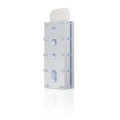Postnova Analytics reports that the Department of Molecular Biology & Biotechnology at the University of Sheffield (UK) is using their AF2000 Field Flow Fractionation system to investigate the mechanism of amyloid formation, a protein mis-folding process implicated to be the cause of Alzheimer’s and other neurodegenerative diseases.
Postnova News
Asymmetrical Flow Field-Flow Fractionation was successfully applied for the purification of halophilic viruses.
Postnova Analytics announces the launch of the EAF2000 - an innovative new simultaneous Electrical and Asymmetrical Flow Field Flow Fractionation (EAF4) system designed to enhance separation and characterisation of biopharmaceutical, environmental and nanomaterials.
Investigating the performance of Asymmetrical Flow- and Centrifugal Field-Flow Fractionation in the characterization of zinc oxide particles in commercial cosmetic products.
Comparison of Miniaturized and Conventional Asymmetrical Flow Field-Flow Fractionation (AF4) Channels for Nanoparticle Separations.


